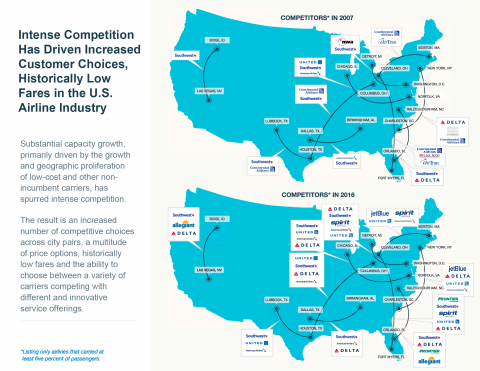WASHINGTON--(BUSINESS WIRE)--Economists with Compass Lexecon, one of the world’s leading economic consulting firms, today released an assessment of competition and consumer choice in today’s U.S. airline industry.
An economic analysis of U.S. airline industry competition, conducted by Dr. Darin Lee and Daniel M. Kasper of Compass Lexecon and commissioned by Airlines for America, found that there is robust competition and choice for the vast majority of domestic and international air travelers. Specifically, the assessment demonstrates that substantial capacity growth, primarily driven by the growth and geographic proliferation of low-cost and other non-incumbent carriers has spurred intense competition. The result is an increased number of competitive choices across city pairs, a multitude of price options, historically low fares and the ability to choose between a variety of carriers competing with different and innovative service offerings.
“A thorough review of the industry over the past decade illustrates that competition is fierce and growing, which is good news for travelers, who have more choices than ever,” said Dr. Lee, an Executive Vice President at Compass Lexecon. “What many have traditionally referred to as the ‘Southwest Effect’ is alive and well and has expanded to more carriers and more markets than ever. The widespread presence of lower-cost carriers in the marketplace has created significant pressure on other carriers to further innovate and offer a broader selection of prices as they vigorously compete for passengers.”
“The benefits of competition are not limited to large communities. Despite the retirement of hundreds of aging 50-seat aircraft that have provided the main link between small communities to larger hubs, both the number of flights and seats at small airports has been increasing for the past three years,” said Mr. Kasper, a Senior Consultant at Compass Lexecon. “In addition, consumers in more rural markets are benefitting from more direct service by ULCCs to major destinations.”
The analysis utilized established criteria for assessing airline industry competition over the past 10 years, which resulted in the following core findings:
- Robust competition spurred by the continued proliferation of lower-cost carriers, as well as the expansion by all carriers into each other’s hubs, has exerted substantial downward pressure on airfares, both before and after the most recent set of airline mergers (i.e., those since 2007).
- Following external shocks that severely impeded the economics of serving small communities, service at small airports has been increasing for the past three years.
- Over the past decade, the number of competitors per route has increased, and new routes have been added.
- Improved financial health has enabled U.S. carriers to invest heavily in their products and services, create thousands of well-paying airline jobs, and substantially increase compensation levels for airline employees.
- The U.S. airline industry’s operational performance and customer satisfaction levels are at all-time highs based on established Department of Transportation and other independent criteria.
About Compass Lexecon
Compass Lexecon is internationally recognized as a leading economic consulting firm with preeminent competition, finance, intellectual property, international arbitration, and energy practices. With more than 400 professionals in 17 offices around the world, Compass Lexecon offers a global perspective on economic matters. For the past 10 years, Compass Lexecon has been ranked as one of the leading antitrust economics firms in the world by the Global Competition Review. To learn more about Compass Lexecon or to find one of our professionals, please visit www.compasslexecon.com
The views expressed are those of the author(s) and not necessarily the views of Compass Lexecon, its management, or its other professionals.



